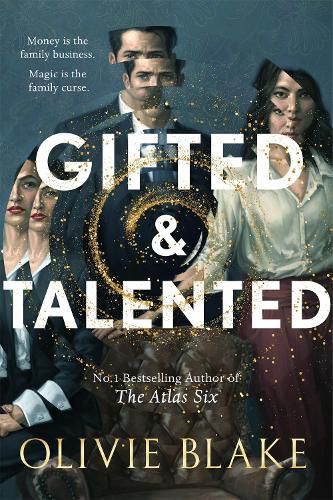Gifted & talented by Olivie Blake

When Thayer Wren dies suddenly his three children must reassess their relationship with their father and the family business, Wrenfare Magitech. The older two, Meredith and Arthur, are relatively close and remember their mother’s struggle with an eating disorder. After her death Meredith dabbled in witchcraft with her best friend Lou, experimenting with the possibility that she could have made her mother happy and saved her; she couldn’t, but with skill, hard work and ruthless ambition she has created her own biotech company, Birdsong, backed, not by the family company, (her father told her she was talentless) but its rival. They have an app, Chirp, which trumpets the claim “this app will make you happy”. Arthur, who his father considered weak, is one of the youngest congressmen ever elected but he feels he is failing, “a new age jester putting up bills that are rendered toothless by the political process and condemned by the echo chamber hive mind of social media” p8. He comforts himself with sex, drugs and partying with his rich friends, Phillippa and Yves, while his wife Gillian manages his public profile and keeps him calm. He suffers from electrokinesis, disrupting electrical signals when not under control. Eilidh Wren was a brilliant ballerina and close to her father but a car accident ended her career and she was given the job of marketing executive at Wrenfare for which she has no talent. Since the loss of her ability to perform she is adrift, and a powerful magic has become a demon in her chest which can help her, but always at an apocalyptic cost. Hovering around the age of 30, the siblings face a time of self-evaluation. In the vacuum of no longer having to question their father‘s love they must confront the randomness of life and question what success really looks like.
Olivie Blake has her finger on the pulse of her generation, the concerns which carried her characters through a privileged but troubled childhood, and complicated search for success as adults, reach a turning point as they approach 30. They must face the versions of themselves left after their father no longer looms large. They may never know who or what their father loved but they can look at their own relationships and test their own values independent of outside ideas of success. There is very little plot and the narrative flagged at times, but Blakes’ sharp and witty dialogue keeps drawing the reader back into the lives of these damaged characters. I loved the integration of magic into the Atlas Six stories but it was not so successful here, the apocalyptic events were odd and Arthur’s electro kinesis a bit interesting but they added nothing to the story. The narrator as a character didn’t work for me but it is interesting that wanting, or having, their own children is put into the mix along with just about every permutation of sexual relationships you can think of, a very modern family saga.
Themes: Sibling relationships, Contemporary fantasy, Relationships.
Sue Speck